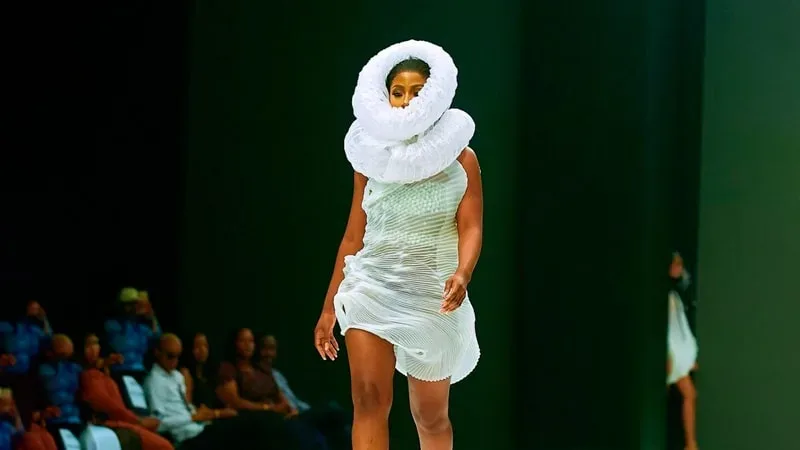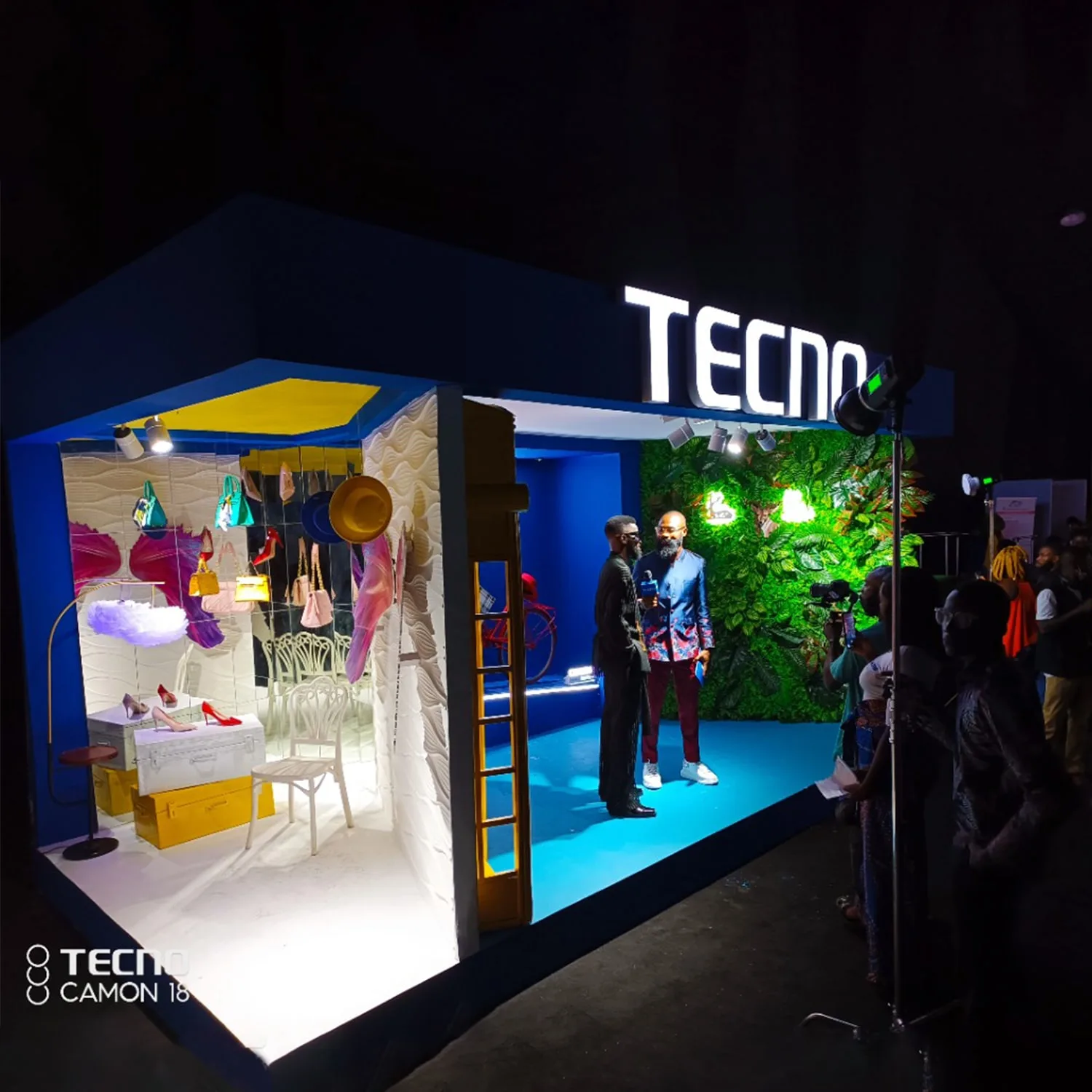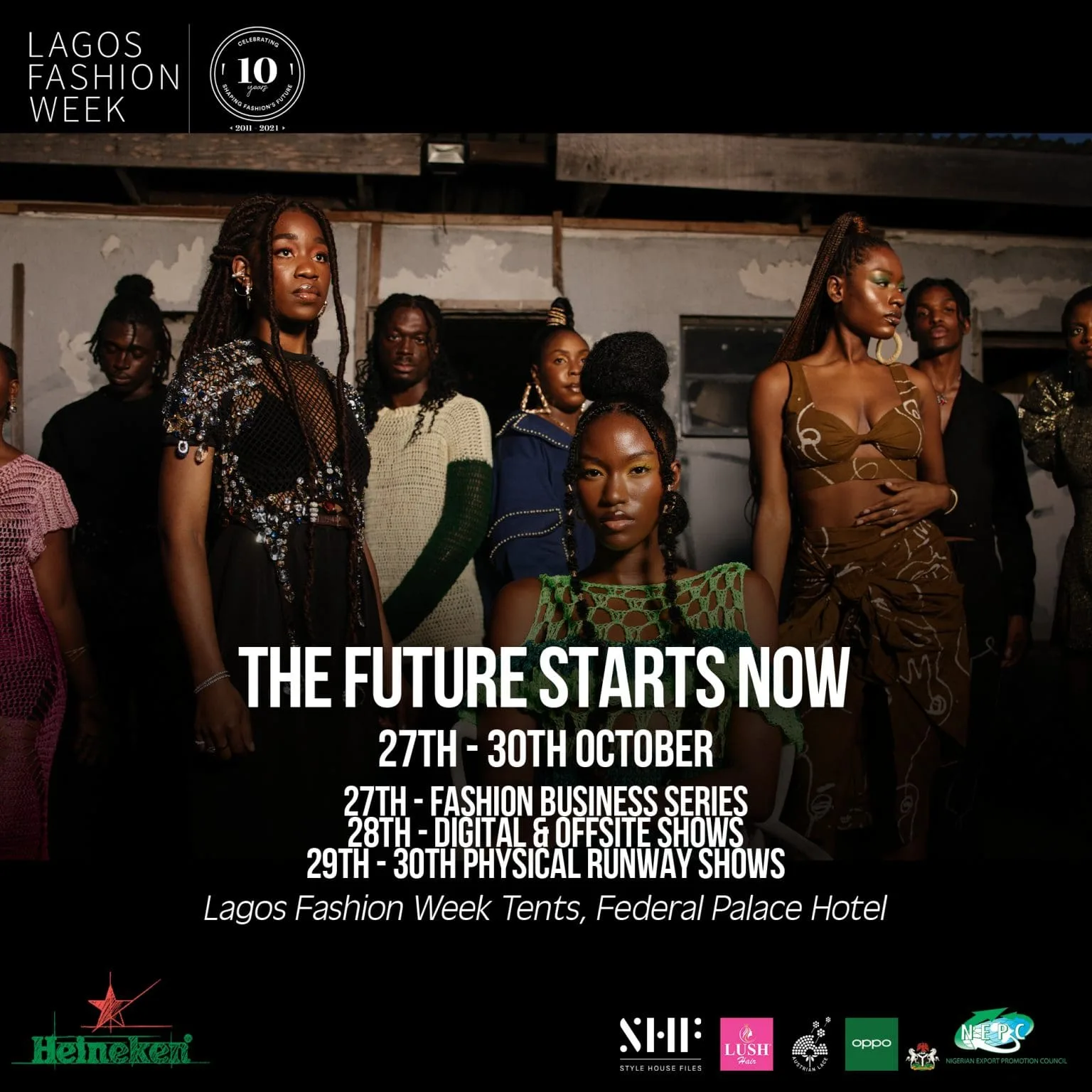Nigeria hosted the Spring/Summer 2024 edition of Lagos Fashion Week, the premier industry exhibition on the continent, which brought together designers from all around Africa. With around 50 runways and presentations throughout the 25–29 October event, which aimed to establish itself as a Pan-African event that could make a significant impact on the global industry agenda, the event has attracted a new wave of creative talent.
Kenya’s Lilabare, Ghanaian minimalist company Ajabeng, and Ivorian designer Aristide Lour, proprietor of Kente Gentleman, were among the new attendees on the itinerary. Distinguished returnees Orange Culture, Iamisigo, Emmy Kasbit, Elie Kuame, Sisano, and Ugo Monye presented a show that defied convention by incorporating theater productions and live vocal performances.
Highlights include the Kente Gentlemen’s performance, which drew inspiration from Robin Givens’s role in the 1992 movie Boomerang, and the trunk displays of Malian designer Awa Meité, which were arranged by Alara, the largest luxury boutique in Lagos.
The British-Nigerian fashion writer and creative consultant Eniafe Momodu, whose previous clients include Casablanca and Grace Ladoja’s well-known Nigerian streetwear event Homecoming, adds, “This has been the best Lagos Fashion Week that I’ve been to.”
“The main runway shows are always incredible, but it’s great to see more well-known designers branching out and producing their shows. This allows them greater creative control over set designs, audience, models, lighting, and other aspects of the show, and it also allows them to curate something that is slightly more tailored to their vision.
The tiny things do have a big impact.
After the epidemic, which subdued the vibrant fashion industry in the city and compelled designers to switch to online activations, Lagos Fashion Week has been trying to recover. This month, the Nigerian naira hit an all-time low of 26% versus the US dollar, a result of the epidemic and socioeconomic reasons such as inflation and the cost of living. These circumstances have had a significant impact on designers.
“Rebuilding has been difficult. It seems as though we are swimming against the stream as a result of the socioeconomic difficulties that are severely affecting the creative sectors. Founder of Lagos Fashion Week, Omoyemi Akerele, adds, “Thanks to partners, it’s a miracle we were even able to pull off Lagos Fashion Week this year.” The political, social, and economic landscapes have all undergone significant transformation.
Lagos Fashion Week boasted an unprecedented number of sponsors this year, including telecom giant MTN, cosmetics brand Bioderma, Ivorian e-commerce platform Anka, and major sponsor Heineken. The event is gradually recovering, according to the organizers, even if attendance and show count haven’t yet returned to pre-pandemic levels.
The five-day event drew over 4,400 people this year, compared to about 3,900 last year.
There was no shortage of press, well-known photographers, and prominent influencers.
International buyers, who have never attended Lagos Fashion Week in large numbers, are still absent. Rather, they view it as a chance to establish relationships with nearby retailers and establish a connection with their domestic clientele.
Major Lagos-based luxury stores, including Alara and Temple Muse, were in attendance.
African designers, such as Christie Brown of Ghana, Maxhosa Africa, and Imprint of South Africa, have been invited to participate in Lagos Fashion Week since 2012.
But younger, up-and-coming designers are starting to prioritize it because they think it may help them establish their brand in one of Africa’s most fashionable cities.
This year’s off-site shows by over ten designers meant that the production, casting, and venue arrangements were handled outside of Lagos Fashion Week. Designers have access to those amenities if they choose to present their collection at the Federal Palace Hotel in Lagos, which serves as the major venue.
Expanding the range and caliber of talent on display at the event was Akerele’s mission as the founder. “This update was planned out. We cannot have the same designers present after 12 or 13 years. They will always have a place, but there is also always room on the schedule for young designers to be supported, she claims.
A Unesco conference was held in conjunction with Lagos Fashion Week, coinciding with the publication of the most recent African fashion report. Unesco presented the possible prospects and problems in the African market to a room full of designers, government officials, and business executives.
Designers joined the stage to share their experiences of creating a brand in Africa in addition to the discussion held by Akerele and Toussaint Tiendrebeogo, secretary of the Unesco 2005 convention on the conservation and promotion of a variety of cultural expressions.
The roundtable conversation featured seven designers and entrepreneurs, including Imane Ayissi, the founder of his own couture house in Cameroon, and Nelly Hagen-Deegbe, the creator of the luxury womenswear brand Duaba Serwa in Ghana.
According to Akerele, the occasion strengthened Lagos Fashion Week’s resolve to feature designers from the continent.
This season’s Lagos Fashion Week served as a reminder of our dedication to the continent.
The research effectively highlights the dynamic nature of the continent’s fashion ecosystem, which can play a pivotal role in propelling sustainable development, the speaker continues. “[Unesco’s] goal and our goal at Style House Files and Lagos Fashion Week have some synergy.”
Organizing an event featuring Pan-African fashion
Designers traveled to Lagos for their fashion week debuts, hoping to capitalize on the hype surrounding the event and increase brand recognition from Kenya to the Ivory Coast.
The Nigerian city is well-known for serving as a launching pad for up-and-coming designers like Lagos Space Programme, and it is home to some well-known designers including Mowalola and Kenneth Ize. African designers get a chance to present their creations on the runways of Lagos Fashion Week.
inside The goal of the Lagos Fashion Weeks is to promote domestic Pan-African design.
Launched in 2020, Ajabeng, a company specializing in Afro-minimalism from Ghana, viewed displaying as a chance to highlight the subtleties of African culture and design while offering a fresh viewpoint on one of the largest runways in West Africa.
Following the brand’s performance, chief executive Kwabena Kwabi Owusu-Adjei told Vogue Business backstage, “Minimalism is a big part of African culture, and the story of African fashion isn’t always maximalism.”
We believe it would be unfair to categorize it as maximalist; thus, what we’re presenting here is an alternative viewpoint:
softer, more subtle styles that are nonetheless distinctly African. It aims to raise awareness of an underappreciated African tale.
The collection by Travis Obeng-Casper, creative director of Ajabeng, had a variety of straight-cut shirts and pants in shades of gray and brown.
Lagos Fashion Week has always been a major goal and a venue for Kenyan-Indian designer Ria Ana Sejpal, the creator of the sustainable Kenyan brand Lilabare, to display her uniqueness. “The rite of passage is Lagos,” the woman claims. It’s the fashion center of Africa. The event is well-known, credible, and has a strong brand.
Since Lagos Fashion Week is well-known and watched, I only wanted to make my debut when we were prepared from start to end.
Her collection included crochet gowns and embellishments, as well as beaded tops created by the Maasai culture in Kenya using a method they learned from Indian beaders.
After showcasing in previous New York and Paris Fashion Weeks, Aristide Lour of Kente Gentlemen felt it was time to focus on the happenings in Africa. Behind the scenes, he remarks, “It’s only fair that I also do the fashion weeks that are on the continent.”
“I regret to inform you that the majority of our clients are located outside of the continent.
However, I do want to be here and have a space. One of the most reputable venues on the continent for attracting journalists and buyers is Lagos Fashion Week.
It was also a way for us to cross this off. We have completed Lagos Fashion Week after Paris.
According to Lour, the objective is to establish brand recognition throughout the continent, starting with Nigeria, by leveraging the Lagos fashion sector.
Later this year, he intends to travel with the collection to other African towns.
Well-known designers generate buzz
For well-known companies, Lagos Fashion Week is more of a chance to honor their hometown than it is to find local designers and spread awareness.
It’s a chance to show more courage and throw a party for brand enthusiasts. On Sunday night, Nigerian designer Sisano summoned live vocalists to start his presentation.
A modern dance performance came next.
Orange Culture made a comeback to the Lagos Fashion Week lineup following a two-year break. Adebayo Oke-Lawal, the founder, declares backstage, “I’m happy to be back.” “I had to come back and show because Lagos is important to our story and because Lagos Fashion Week is important to our journey.”
According to event founder Akerele, mentoring and advice have been crucial in assisting the brand’s evolution from a Lagos-based company to a worldwide one.
That inspired me to return and honor Lagos Fashion Week and the contributions it makes to the local creative community.
I did, however, also want to commemorate my people, and that is the purpose of an Orange Culture concert.
Designer Emmanuel Okoro drew sizable audiences that filled the arena to full, while Lagos brand Emmy Kasbit ended the event. The Ukara fabric, a textile that is owned by a group of men in Igboland, southeast Nigeria, and represents wealth, power, and dignity, served as the inspiration for this season’s design.
With this collection, which included about thirty pieces, the company included trademark prints for the first time in its fourteen-year existence.
Governor Babajide Sanwo-Olu, who Okoro ended the event with, stunned many of the spectators by endorsing a young designer.
Men’s tailoring behemoth Ugo Monye, sometimes referred to as “Savile Row of Nigeria,” ended Friday night’s performances. He may highlight the wide range of customization his label offers by showcasing at Lagos Fashion Week.
Even if the majority of his clientele are from West Africa, there is a chance to make enough of a stir that the global market would take note.
Even if his runway performances are quite dramatic, he still wants to establish a connection with the global market.
Monye declares, “I’m trying to bring the West and Africa together.” “We combine our African fabrics or our distinctive patterns with readily wearing outfits for them.
I try to find a middle ground where people from the West and Africa may wear our items together. This includes a variety of baggy shirts and pants and men’s abayas.
To increase the export of African fashion labels, Akerele is eager to work with creative partners. Anka, an Ivorian marketplace that aims to establish an Amazon-like empire in Africa, took advantage of Fashion Week to meet designers and integrate them into the Anka platform.
The objective, according to co-founder Moulaye Tabouré, is to boost African businesses’ sales on the global market.
Merely 5% of Anka’s sales take place inside the continent; the remaining 95% are exported, with the US market accounting for the majority of these sales.
Anka raised $5 million in funding in September and has already generated $50 million in sales.
Like the previous year, New York-based store Moda Operandi did not physically attend the five-day event, but it is still supporting designers by showcasing designers from past seasons, including industry titans Orange Culture and Lisa Folawiyo, in their yearly Lagos Fashion Week capsule.
Folklore Connect was also absent from this year’s festival, but the platform claims it will keep an eye on the designers exhibiting to find fresh talent for their platform.
Even if the goal of Lagos Fashion Week is to revitalize the African retail sector, it’s also important to reach a global audience.
Lagos Fashion Week is unable to bring in international buyers, unlike other fashion weeks outside of the major four, such as Copenhagen. Rather, the event makes use of alliances with foreign retailers.
While Folklore Connect utilizes Lagos Fashion Week to find up-and-coming talent from abroad, Moda Operandi hosts a Lagos Fashion Week capsule on its website.
A “Woven Threads” pop-up featuring 17 African companies was held at Selfridges.
Big and small designers alike have a chance to become well-known worldwide. Momodu, a consultant, claims that Nigerian and African designers aren’t restricted to a certain style or area.
“As global designers who are creating from a worldwide perspective, they do not consider themselves to be exclusively Nigerian designers.
Whether someone, somewhere in the globe, will be able to relate to your pieces is ultimately what matters, not where you live or where you are geographically situated.
Every designer should not be restricted by the nation of their birth because we live in a globalized society.
Content courtesy of Vogue Business & NFH




